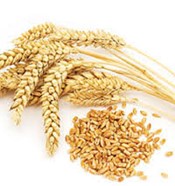Gluten-free diets have become popular with some weight-loss dieters and nutrition-conscious consumers. But recent studies show that most dieters who remove gluten from their diet are making these changes without a strong medical reason. “If you have a condition known as celiac disease, it is essential to avoid all foods containing gluten,” says Susan Nitzke, a UW-Madison Professor Emerita and UW-Extension nutrition specialist.
Gluten is one of the main forms of protein in wheat. It is also found in grains that are related to wheat – namely barley and rye. Bakers are very familiar with gluten because it forms a stretchy substance when mixed with water. This stretchy gluten helps baked products such as bread and muffins “rise” by trapping air bubbles that are formed by leavening agents such as yeast or baking powder.
“About one of every hundred adults has celiac disease, but most of them don’t know it,” says Nitzke. “When a person has celiac disease, gluten destroys part of the lining of the small intestine and interferes with the person’s ability to absorb nutrients from food.” This can lead to abdominal pain, bloating or diarrhea. If celiac disease goes untreated, other conditions such as anemia and osteoporosis may develop in addition to abdominal discomfort.
On the other hand, gluten-free diets are not necessary for the general public. Contrary to messages in some popular diet books, avoiding bread, pasta and other products made with wheat will not necessarily help you lose weight. “If avoiding gluten means you eat fewer doughnuts and cookies, you may lose weight on a gluten-free diet,” says Nitzke. But she points out that many specialty gluten-free products are high in sugar and fat, so there’s no guarantee that a gluten-free diet is healthier or lower in calories than a diet that includes wheat and other grains.







